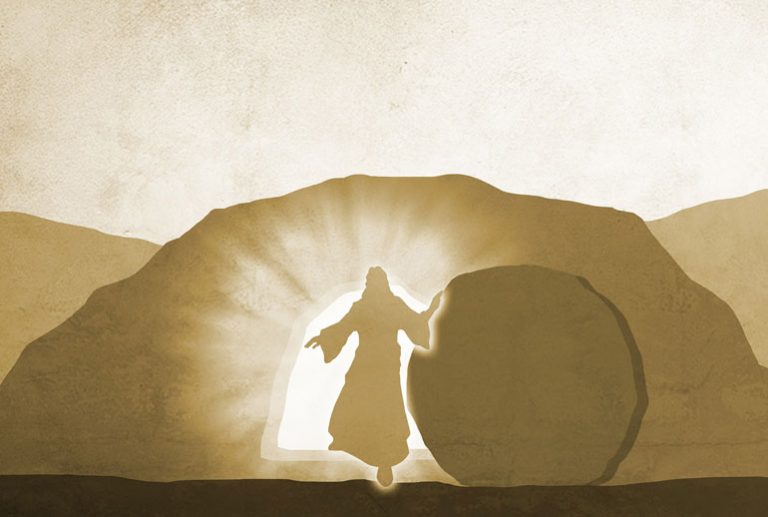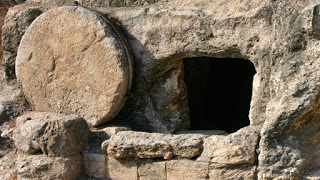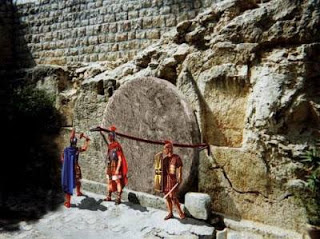The only explanation that Mary Magdalene could imagine upon finding the tomb empty was that Jesus’ enemies had stolen the body:
They asked her, ‘Woman, why are you weeping?’ She answered, ‘They have taken my Lord, and I do not know where they have laid him.’ (John 20:13)
However, logic tells us that the enemies of Jesus could not have been responsible for such a sacrilegious act. They were the ones most invested in preventing any rumor that the prophecy of the third-day resurrection might have come true. Let us recall the words of the chief priests to Pilate on Friday afternoon:
Therefore, give orders that the tomb be made secure until the third day, lest his disciples come and steal him away and tell the people, ‘He has been raised from the dead.’ This last deception would be worse than the first. (Matthew 27:64)
Thus, in addition to having the tomb sealed with the imperial seal, they convinced the governor to assign a squad of Roman soldiers to guard it.
Despite these precautions, when the body disappeared, the guards had no explanation. Fearing the consequences of failing in their duty, they went to the Sanhedrin for help in crafting a narrative that would protect them: “You are to say, ‘His disciples came during the night and stole him while we were asleep.’” (Matthew 28:13)
This invented version presents a logical problem. It should not be assumed that all the soldiers fell asleep at the same time, or that guard duty was only carried out during the day. In concocting this false story, the soldiers were, in fact, incriminating themselves against a serious military offense—falling asleep on duty. As discussed in the fourth thesis of this chapter, the punishment for such a crime was to be flogged in public until unconsciousness.
Therefore, the bribe offered to them must have been substantial enough to justify the risk: “They gave a large sum of money to the soldiers.” (Matthew 28:12)
Had the soldiers used the story for which they were paid, and if Pilate had found out, his wrath would have fallen upon them—especially because their account could not withstand even basic scrutiny.
- If all the guards had fallen asleep, how could they identify the culprits?
- If they knew it was the disciples, how could they also claim they had been asleep?
- And if they had not been asleep, how could they have allowed the theft to occur?
Whatever version they offered, they would end up in serious trouble. Their only hope was that their superiors would not investigate further, allowing them to preserve their lives—and enjoy the bribe they had accepted.
Several days after that resurrection Sunday, Peter gave his first public speech before a crowd of Jews and Gentiles. Standing in the public square, he interpreted the Scriptures (Acts of the Apostles 2:14–41), referenced the prophecies about the Messiah, and emphasized that it had been foretold that the Messiah would not remain in the grave, nor would His body undergo corruption. He then testified, along with the other apostles, that they were eyewitnesses to the resurrection of the Master.
The response to Peter’s proclamation was overwhelming. The Scriptures record that on that day, “about three thousand persons” believed and were baptized.
Now, if the enemies of Jesus had possessed His corpse, would this not have been the perfect moment to discredit the disciples’ claims of a resurrection? Would this not have been a golden opportunity to expose them as liars?
They could have simply produced the body, laid it in the middle of the square, and exposed the apostles as frauds, thereby extinguishing, at its very inception, the fledgling Church that was beginning to take form. After all, the resurrection of the Messiah was the foundation of the Church that, by the command of Jesus, had just begun to be built. If that claim were disproven, Christianity would have ended right then and there.
If Jesus’ enemies had stolen His body from the tomb, then where did they put it? Could there have been a more secure location than the guarded tomb, sealed by the authority of Caesar and protected by soldiers of the most powerful army in the world?
If the enemies of Jesus had deliberately removed the body to fool the disciples, only to later reveal it in public, why did that moment never come? Why did they remain silent?
It becomes increasingly clear that the enemies of Jesus must be ruled out as suspects—because nothing harmed them more than the fact that the body had disappeared.







